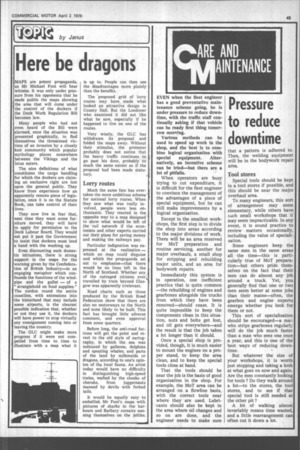Here be dragons
Page 45

If you've noticed an error in this article please click here to report it so we can fix it.
MAPS are potent propaganda, as Mr Michael Foot will bear witness. It was only under pressure from his opponents that he made public the maps showing the area that will come under the control of the dockers if the Dock Work Regulation Bill becomes law.
Many people who had not even heard of the Bill were alarmed, once the situation was presented graphically, to find themselves the threatened victims of an invasion by a closely knit community which popular mythology places somewhere between the Vikings and the lotus eaters.
The nice definitions of what constitutes the cargo handling for which the dockers are claiming an exclusive right are lost upon the general public. They know from experience how an apparently remote piece of legislation, once it is on the Statute Book, can take control of their lives.
They now live in fear that, next time they want some furniture moved, they will have to apply for permission to the Dock Labour Board. They would not put it past the Government to insist that dockers must lend a hand with the washing up.
Even discounting such domestic intrusions, there is strong support in the maps for the warning given by the Confederation of British Industry—in an engaging metaphor which confounds the functions of the windpipe and the gullet — of a " stranglehold on food supplies." The cordon round the entire coastline, with extensions into the hinterland that may include some airports, is the clearest possible indication that, whether or not they use it, the dockers will have power to stop virtually any consignment coming into or leaving the country.
The GLC might make more progress if it were not compelled from time to time to illustrate with a map what it is up to. People can then see the disadvantages more plainly than the benefits.
The proposed grid of lorry routes may have made what looked an attractive design in County Hall. But the Londoner who examined it did not like what he saw, especially if he happened to live on one of the routes.
Very wisely, the GLC has withdrawn its proposal and folded the maps away. Without their stimulus, the protester probably does not notice that the heavy traffic continues to go past his door, probably to much the same extent as if the proposal had been made statutory.
Lorry routes
Much the same fate has overtaken the more ambitious scheme' for national lorry routes. When they saw what was really involved, people were less enthusiastic. They reacted in the opposite way to a map designed to show what would be left of the rail network if the economists and other experts carried Out their plans for saving money and making the railways pay.
Particular indignation was expressed at the realisation — which no map could disguise and which the propaganda set out to emphasise—that there would be no lines left in the North of Scotland. Whether any of the outraged citizens ever, travelled by train beyond Glasgow was apparently irrelevant.
Road charts such as those produced by the British Road Federation show that there are also no motorways to the North and none likely to be built. This fact has brought little adverse comment, and even approval from some quarters.
Before long, the anti-road factions will get the point and revert to the old style of cartography, in which the sea was indicated by galleons, dolphins and spouting whales; and parts of the land by milkmaids or dragons, according to one's opinion of the local fauna. An artist today would have no difficulty in distinguishing high-speed trains, wafted by the cheeks of cherubs, from juggernauts manned by devils with forked tails.
It would be equally easy to embellish Mr Foot's maps with pictures of sharks in the harbours and Barbary corsairs sunning themselves on the jetties.




























































































